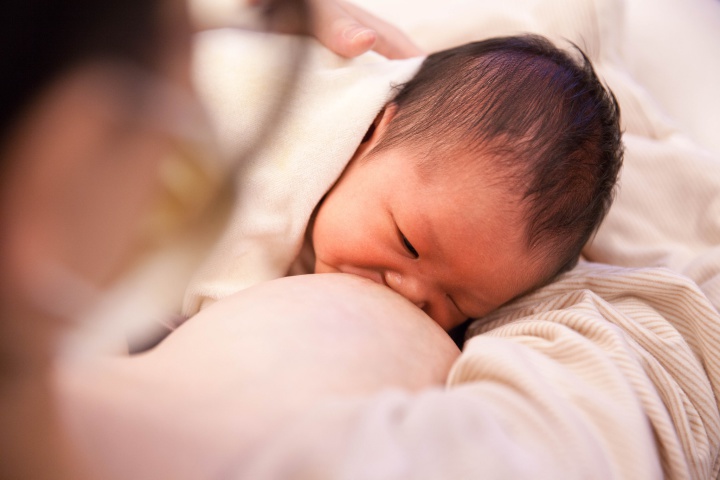Karen Brown, Health Correspondent
A Wellington doctor says pressure to get new mothers breast-feeding quickly is driving up the increase in tongue-tie cuts in new-born babies.

Tongue-tie procedures involve snipping a tissue or band connecting a baby's tongue to the lower jaw, to improve breast-feeding. Photo: marki1983/Flickr
Tongue-tie procedures involve snipping a tissue or band connecting a baby's tongue to the lower jaw, to improve breast-feeding.
Last month, Wellington anesthetist Graham Sharpe called for urgent action over the surgery after an eight day old baby needed emergency care for bleeding after the snip.
Annie Judkins, who works as a General Practitioner (GP) in Porirua and Lower Hutt, said it's done before mothers see their GP to get breast-feeding under way so they can go home.
"The drive to get them off the midwives' books and out of the hospital fully breast-feeding is, I believe, the major driver.
"The fact that they've instigated this process and the surgical procedure with no barriers, boundaries and processes behind it is just a mockery, its a sham," Dr Judkins said.
She said it introduces the idea that there's something abnormal about a baby and takes attention away from other issues that may be involved - such as domestic violence, depression, anxiety or exhaustion.
"We get breast is best absolutely, that's fine, but it doesn't always work well. And if it doesn't, babies are born knowing how to suck. They're not born, every child, with an abnormality."
Dr Judkins added she's only ever seen one baby who actually needed the snip to be able to breast-feed.
"I've seen one baby's tongue that I knew needed to be done. I've never seen any others that I thought needed to be done, and I've put my fingers into thousands of babies' mouths to check their suck over the last, you know, 28 years."
No one knows how many of the procedures are done a year, or the numbers being carried out by midwives, dentists, GPs and surgeons.
Ministry of Health's Child and Youth Health chief adviser Pat Tuohy estimated it will be 10 to 12 percent of births, or at least 6000 a year.
He said there has been harm done, but only occasionally.
Nevertheless, the Ministry will now produce guidelines on it for everyone.
"Prior to this we've been reasonably satisfied that professional groups have developed their own guidance for their profession about the effective and safe way to address the issue of tongue-tie.
"But it's clear from the Health and Disability Commissioner case that this has not been sufficient, and so we are happy to work to pull people together across a wider range of specialties," Dr Tuohy said.
Dr Judkins said the lack of information is unacceptable.
"And yet we've got no national data on how many, why or when or how.
"I mean I think that's actually appalling, you know, so at least if the Ministry is taking a stand and saying well actually we need some guidelines, which we... we need some recording."
Waitemata Hospital ear, nose and throat surgeon, David Grayson, said it has followed Canterbury District Health Board which has reduced the number of these procedures by team decision-making involving lactation experts, midwives, and specialists.
"That's the best way where there is any doubt as to whether you should be doing it, that you've got somebody to defer to where you feel that there's somebody expert that can take it on and then decide. But the decision itself is always done very much in conjunction with the mother."
The Ministry said it's already begun work on assembling a group to work on the guidelines.



 Binoy Kampmark: Jesting On The Environment - Australian Mining Gets A Present
Binoy Kampmark: Jesting On The Environment - Australian Mining Gets A Present Martin LeFevre - Meditations: The Antithesis Of What Jesus Taught And Lived
Martin LeFevre - Meditations: The Antithesis Of What Jesus Taught And Lived  Ramzy Baroud: The West Bank's Men Of The CIA - Why Is The PA Killing Palestinians In Jenin?
Ramzy Baroud: The West Bank's Men Of The CIA - Why Is The PA Killing Palestinians In Jenin? Binoy Kampmark: Concentrated Markets And Iceless Fokkers
Binoy Kampmark: Concentrated Markets And Iceless Fokkers Binoy Kampmark: Catching Pegasus - Mercenary Spyware And The Liability Of The NSO Group
Binoy Kampmark: Catching Pegasus - Mercenary Spyware And The Liability Of The NSO Group Ramzy Baroud: The World Owes Palestine This Much - Please Stop Censoring Palestinian Voices
Ramzy Baroud: The World Owes Palestine This Much - Please Stop Censoring Palestinian Voices